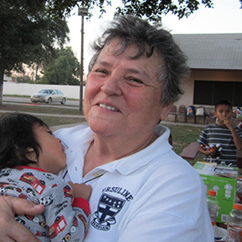Sister Maria Teresa de Llano, OSU

Laredo native Sister Maria Teresa de Llano began her ministry with immigrants when she was assigned to her hometown in July 2014. “I took a day or two to settle in, then at the recommendation of my two Ursuline Sisters, Karen Schwane and Carmel Rangel, I went to Catholic Social Services to see where I could be of service,” she says.
“I began volunteering where I was needed and shortly after was hired by the executive director of Catholic Social Services to assist, accompany, listen to and make sure those who had received temporary asylum arrive at their destination in the United States, Maria Teresa says. “I started assisting by providing humanitarian aid such as clean clothes, showers, water, food and other necessities to those who were brought to us by Immigration and Customs Enforcement (ICE). We also provided the families with phones to connect with their relatives in the United States.
“When I was a child growing up in Laredo, the people crossing the border mostly were from Mexico, forced by extreme poverty to seek a better life for themselves and their families,” she says. “In the past few years, however, the demographics of migration have shifted and most people crossing over are fleeing from Honduras, El Salvador and Guatemala. Gang violence, extortion, drug lords as well as poverty, lack of jobs and little or no opportunity for education for their children have driven them to leave their homeland and seek asylum in the United States. Their greatest dream is to have a job and be able to support their families, provide education for their children and a safe place for them to live.”
Sister Maria Teresa says that most people she has welcomed at the humanitarian relief center are very simple, humble people—usually from rural areas—fleeing a terrible situation, asking for asylum and hoping to be allowed into the United States. “They often come with only one of their children, leaving behind the younger ones to the care of the grandparents and relatives. It is too difficult, dangerous and costly to bring the entire family. Their hope is that with time and lots of hard work, they can be reunited with those they left behind. They know only too well it will be a long time before this happens, and through it all what sustains them is hope for a better future and faith in a compassionate God.”
A recent change in government policy has increased the challenges faced by migrants and those seeking to assist them. “Right now we are in a crisis,” Sister Maria Teresa says, “because Cubans who were on their way are no longer allowed to enter the United States.” The change occurred after former President Barack Obama issued this Jan. 12 policy statement: “The Department of Homeland Security is ending the so-called ‘wet-foot/dry foot’ policy, which was put in place more than 20 years ago, and was designed for a different era. Effective immediately, Cuban nationals who attempt to enter the United States illegally and do not qualify for humanitarian relief will be subject to removal, consistent with U.S. law and enforcement priorities.”
The “wet foot/dry foot” policy—the name given to a consequence of the 1995 revision of the Cuban Adjustment Act of 1966—essentially said that anyone who fled Cuba and entered the United States would be allowed to pursue residence a year later. The recent policy change has left about 1,000 Cubans stranded between the United States and Cuba, Sister Maria Teresa says.
“We respond to the crisis as best we can, providing food, clothing and shelter not only for Cuban immigrants but also for Central Americans and Mexicans who are being deported daily,” she says. “We live with ambiguity and literally go day by day. It is a way of being in solidarity with the thousands of refugees and asylum seekers who live day by day, moment by moment, not knowing what will become of them and their families.”

